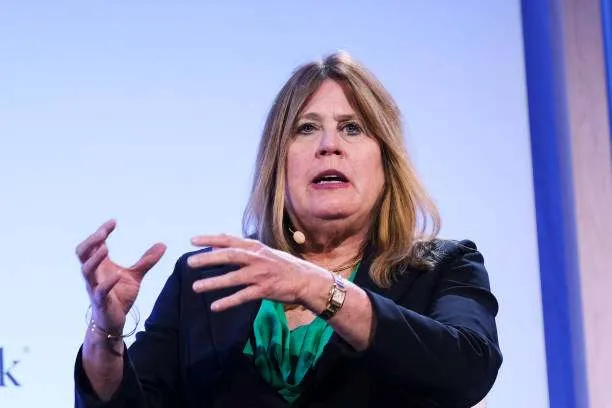Freeport-McMoRan sees Trump’s tariff policy as double-edged for copper industry
CEO Kathleen Quirk warns tariffs may boost short-term profits but threaten long-term global demand.
 |
| Kathleen Quirk, CEO of Freeport-McMoRan, speaks at the CERAWeek by S&P Global conference in Houston, Texas, on Monday, March 10, 2025. Photo by F. Carter Smith/Bloomberg |
By Anna Fadiah and Hayu Andini
Freeport-McMoRan sees Trump’s tariff policy as double-edged for the copper industry, according to CEO Kathleen Quirk, who warned that while the tariffs may temporarily increase profits, they could also spark a global economic downturn that undermines demand. Speaking at the annual CESCO copper conference in Santiago, Chile, Quirk expressed deep concern about the long-term implications of the U.S. government’s recent tariff hike on a range of imported products.
On Monday, April 7, Quirk told conference attendees that the trade barriers imposed by the Trump administration—ranging from 10% to 50%—had already begun to shake investor confidence. “We cannot ignore the fact that trade wars can discourage people from investing, delay purchases and change consumption patterns, all of which will impact demand,” Quirk said, emphasizing that the copper industry depends heavily on long-term global economic stability.
A potential $400 million gain with major risks
From a narrow business standpoint, Freeport-McMoRan could see a substantial windfall—estimated at up to $400 million annually—due to the tariffs on competing copper imports. But Quirk underscored that this short-term benefit must be weighed against broader economic threats.
“The copper market isn’t just about this year’s numbers,” she said. “We’re part of a supply chain that spans continents and decades. If growth stalls or global investment slows, we all lose. My concern is not just about short-term profits, but the long-term sustainability of the industry.”
Quirk’s remarks come at a pivotal time for global trade. Financial markets have shown increasing volatility since Trump introduced the tariffs, and diplomatic tensions between the U.S., China, and the European Union have escalated in response. The copper sector, with its deep reliance on international infrastructure and energy development, is particularly vulnerable to prolonged economic uncertainty.
Copper demand tied to economic growth
The copper industry, Quirk explained, serves as a kind of economic thermometer. Copper is used in a wide range of industries, including construction, electronics, and clean energy. As such, its demand is tightly linked to the health of the global economy. If investment slows due to fears of inflation or recession, copper usage is likely to decline sharply.
“We all remember the financial crisis of 2008,” Quirk told Reuters in a separate interview. “Demand fell off a cliff. That’s not a scenario we want to repeat.”
She added that investors and governments alike must take a cautious approach when implementing sweeping economic policies. While the intention behind the tariffs might be to stimulate domestic industry, the global economy is so interconnected that unintended consequences are almost inevitable.
Global operations bring global responsibilities
Freeport-McMoRan’s operations are spread across key copper-producing regions, including Chile, Peru, the United States, Indonesia, and Europe. This makes the company especially sensitive to shifts in global trade policy.
Quirk welcomed the Trump administration’s push to increase domestic copper production but emphasized that any such effort must align with international cooperation and sustainable development.
“We support strengthening U.S. copper capacity,” she said. “But we also recognize that our markets are international. It’s not possible to isolate ourselves completely and still thrive. We rely on equipment from Europe, labor from South America, and customers in Asia. A balanced approach is essential.”
Inflation concerns add to uncertainty
Another key risk posed by the tariffs is inflation. With import prices rising, the cost of raw materials may increase across multiple sectors. This could put pressure on construction, energy, and technology companies—all major consumers of copper—and further weaken demand.
Quirk noted that inflationary pressures would likely be felt first in emerging markets, which have driven much of the growth in copper demand over the past decade. “If these countries can no longer afford to build at the same pace, we’ll feel that ripple across our entire industry.”
An industry built on investment and trust
Copper mining is a capital-intensive industry, requiring long-term planning and billions of dollars in infrastructure. Any uncertainty—whether economic or political—can lead companies and governments to delay or cancel major projects.
“When you invest in a mine, you’re thinking 20 to 30 years out,” Quirk said. “We need to be confident that the market will be there. If policy changes every few years or international partnerships are threatened, it becomes harder to justify those investments.”
Despite the potential boost from the tariffs, Freeport-McMoRan continues to take a cautious stance, prioritizing long-term growth and stability over quick profits. The company remains committed to environmental standards and collaborative relationships with local communities in all its operating countries.
Calls for cooperation and dialogue
Quirk concluded her remarks at the CESCO conference by urging world leaders to find common ground and avoid the type of zero-sum thinking that often accompanies trade disputes. “There’s a lot at stake,” she said. “The copper industry is foundational to the world’s future—from electrification to renewable energy to infrastructure. We need stable markets, smart policy, and a shared vision.”
She called for renewed international dialogue, suggesting that business leaders, policymakers, and trade representatives must work together to avoid unnecessary economic harm.
As Freeport-McMoRan sees Trump’s tariff policy as double-edged for the copper industry, CEO Kathleen Quirk’s message is clear: profit should never come at the cost of global stability. While the tariffs may offer a temporary financial advantage, their broader impact could destabilize copper demand, trigger inflation, and discourage the investment needed for long-term sustainability.
With operations spanning the globe, Freeport-McMoRan stands at the crossroads of economic policy and international trade—highlighting the delicate balance between national interests and global cooperation in today’s interconnected world.
